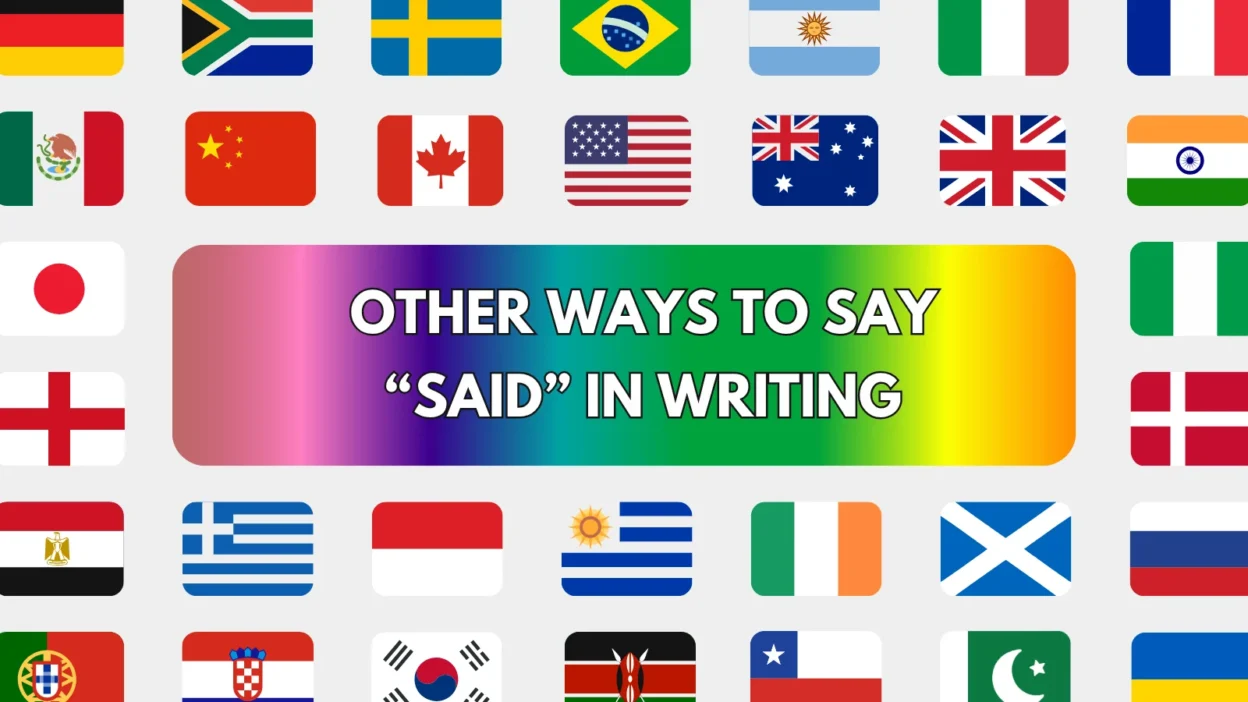Using the word “said” is simple and clear — but when writing stories, essays, or dialogues, repeating it can make your text feel dull or repetitive. There are many expressive alternatives that can reveal emotion, tone, and intention, helping readers better understand how something was spoken.
Whether you’re crafting fiction, reporting, or academic work, these alternatives to “said” will bring your writing to life.
Here are 25 powerful ways to replace “said”, complete with meanings, examples, and tones to match different writing styles.
1. Stated
Meaning: Formally expressed or declared something.
Detailed Explanation: Common in academic or professional writing to report facts or claims.
Scenario Example: The manager stated that all reports must be submitted by Friday.
Best Use: Formal documents, essays, reports.
Tone: Neutral, official.
2. Explained
Meaning: Gave more detail or clarification about something.
Detailed Explanation: Ideal when someone is elaborating or providing information.
Scenario Example: She explained how the new system would improve efficiency.
Best Use: Instructional or descriptive dialogue.
Tone: Informative, clear.
3. Replied
Meaning: Responded to a question or statement.
Detailed Explanation: Natural replacement for “said” in conversational exchanges.
Scenario Example: “I’ll be there soon,” he replied.
Best Use: Fictional dialogue, conversations.
Tone: Neutral, responsive.
4. Mentioned
Meaning: Referred to something casually or briefly.
Detailed Explanation: Suggests that the speaker didn’t emphasize it heavily.
Scenario Example: She mentioned that the meeting had been postponed.
Best Use: Narration, summaries, dialogue.
Tone: Light, neutral.
5. Announced
Meaning: Made a public or formal statement.
Detailed Explanation: Adds a sense of authority or importance.
Scenario Example: The CEO announced the launch of the new product.
Best Use: News, speeches, formal updates.
Tone: Confident, official.
6. Declared
Meaning: Stated something firmly or officially.
Detailed Explanation: Conveys strength, certainty, or public commitment.
Scenario Example: The president declared the new policy effective immediately.
Best Use: Political, historical, or formal writing.
Tone: Strong, assertive.
7. Whispered
Meaning: Spoke softly or quietly.
Detailed Explanation: Implies secrecy, intimacy, or fear.
Scenario Example: “Don’t wake the baby,” she whispered.
Best Use: Fictional dialogue, emotional scenes.
Tone: Gentle, secretive.
8. Shouted
Meaning: Spoke loudly, often in anger or excitement.
Detailed Explanation: Adds intensity and emotion to dialogue.
Scenario Example: “Watch out!” he shouted as the ball flew past.
Best Use: Action scenes, arguments, or emergencies.
Tone: Loud, emotional.
9. Murmured
Meaning: Spoke in a low, soft, or indistinct way.
Detailed Explanation: Often used in romantic, tender, or reflective scenes.
Scenario Example: “It’s going to be okay,” she murmured.
Best Use: Fiction, emotional storytelling.
Tone: Soft, intimate.
10. Suggested
Meaning: Offered an idea or proposal.
Detailed Explanation: Indicates politeness or indirect communication.
Scenario Example: He suggested taking a different route to avoid traffic.
Best Use: Discussions, polite speech.
Tone: Helpful, neutral.
11. Argued
Meaning: Disagreed or presented reasons against something.
Detailed Explanation: Conveys conflict, debate, or persuasion.
Scenario Example: She argued that the new rule was unfair.
Best Use: Debates, dialogues, essays.
Tone: Firm, assertive.
12. Added
Meaning: Gave extra information to what was already said.
Detailed Explanation: Smoothly continues dialogue or explanation.
Scenario Example: “And don’t forget the meeting,” he added.
Best Use: Dialogue tags, reports.
Tone: Neutral, connecting.
13. Inquired
Meaning: Asked about something formally or politely.
Detailed Explanation: A sophisticated alternative to “asked.”
Scenario Example: He inquired whether the project was still on schedule.
Best Use: Formal conversations, writing reports.
Tone: Polite, formal.
14. Responded
Meaning: Gave an answer or reaction.
Detailed Explanation: Works well in both formal and informal writing.
Scenario Example: “Yes, that’s correct,” she responded confidently.
Best Use: Dialogue, interviews.
Tone: Calm, direct.
15. Admitted
Meaning: Confessed or acknowledged something.
Detailed Explanation: Implies honesty, guilt, or vulnerability.
Scenario Example: He admitted that he had forgotten the deadline.
Best Use: Emotional, reflective, or narrative writing.
Tone: Honest, humble.
16. Exclaimed
Meaning: Spoke suddenly and excitedly.
Detailed Explanation: Used to show emotion, joy, or surprise.
Scenario Example: “That’s incredible!” she exclaimed.
Best Use: Fiction, emotional writing.
Tone: Excited, expressive.
17. Noted
Meaning: Pointed out something important or worth remembering.
Detailed Explanation: Formal but less emotional — ideal for writing summaries.
Scenario Example: The researcher noted that results varied across samples.
Best Use: Academic, analytical writing.
Tone: Objective, professional.
18. Remarked
Meaning: Made a brief comment or observation.
Detailed Explanation: Neutral or mildly thoughtful in tone.
Scenario Example: “It’s colder than usual,” he remarked.
Best Use: Dialogue, reflective writing.
Tone: Calm, observational.
19. Commented
Meaning: Expressed an opinion or reaction.
Detailed Explanation: Useful when describing discussion or social response.
Scenario Example: She commented that the new design looked modern.
Best Use: Reports, dialogue, media writing.
Tone: Neutral, informative.
20. Insisted
Meaning: Firmly demanded or maintained a statement.
Detailed Explanation: Adds strength or stubbornness to dialogue.
Scenario Example: “I’m telling the truth,” he insisted.
Best Use: Arguments, persuasive dialogue.
Tone: Forceful, determined.
21. Recalled
Meaning: Spoke of something remembered.
Detailed Explanation: Adds depth or nostalgia to writing.
Scenario Example: She recalled how they met years ago in college.
Best Use: Storytelling, reflection, memory scenes.
Tone: Reflective, emotional.
22. Observed
Meaning: Noted or stated an observation thoughtfully.
Detailed Explanation: Suggests insight or analysis.
Scenario Example: He observed that the market trends were shifting.
Best Use: Analytical writing, character dialogue.
Tone: Intellectual, calm.
23. Confessed
Meaning: Admitted something personal or secret.
Detailed Explanation: Implies honesty, guilt, or relief.
Scenario Example: “I was the one who broke it,” she confessed quietly.
Best Use: Emotional dialogue, storytelling.
Tone: Vulnerable, sincere.
24. Reassured
Meaning: Spoke to comfort or give confidence.
Detailed Explanation: Indicates empathy and encouragement.
Scenario Example: “You’ll do great,” he reassured her.
Best Use: Supportive dialogue, motivation.
Tone: Warm, gentle.
25. Declined
Meaning: Politely refused or rejected something.
Detailed Explanation: Adds subtlety and grace to refusal.
Scenario Example: She declined the invitation with a smile.
Best Use: Formal, polite communication.
Tone: Courteous, restrained.
Conclusion
Replacing “said” with more specific verbs like “explained,” “replied,” or “remarked” can instantly elevate your writing. The right choice helps convey tone, emotion, and intent — transforming plain dialogue into vivid, engaging storytelling.
Choose your alternatives based on the situation: use formal ones for reports, expressive ones for fiction, and neutral ones for clarity. Every word you pick adds character to your writing.

Naz Fatima is an author at Saypadia who specializes in writing clear, relatable, and reader-friendly content about language, expressions, and modern terminology. She enjoys breaking down meanings with real-life context so readers can quickly understand and apply them. Naz’s work reflects a strong commitment to clarity, accuracy, and helping users find quick answers without confusion.




